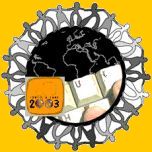

Berichte
WSF endet mit politischen Aufrufen und Aktionsplan

(by Alejandro Kirk, IPS-TerraViva)
The 21 thematic assemblies thus broke the WSF seemingly taboo issue of taking common political stands, under pressure from thousands of civil society groups anxious to seize the opportunity opened by the global economic crisis to progressive change.
A week of demonstrations and propagandistic actions will take place between March 28 and April 4 to press a drastic change in the world's political balance and urgent measures to stop climate change.
Key target of this initiative is the summit of the G-20 group of industrial and emergent economies scheduled for April 2 in London, taking place in the midst of the deepening global economic crisis.
G-20 members Argentina and Brazil, both led by progressive governments, are expected to voice WSF demands such as the disbanding or deep reform of the International Monetary Fund, the World Bank and the World Trade Organization.
March 30, the Palestinian Day of Return to their land, is another important mark in the program, aimed at imposing a trade boycott, international sanctions and de-investment policies, to force Israel to stop military assaults against Gaza and engage in true peace negotiations.
Under a slight rain at a soaked lawn in Belém's vast Federal Amazonian Rural University campus, a spokesman of the WSF's Assembly of Social Movements itemized some of the wider programmatic contents of the mobilization:
- Nationalization of banks;
- No reduction of salaries at enterprises hit by the crisis;
- Energy and food sovereignty for the poor;
- Withdrawal of foreign troops from Iraq and Afghanistan;
- Sovereignty and autonomy for indigenous peoples;
- Right to land, decent work, education and health for all;
- Democratization of media and knowledge
On October 12, day in which Spanish conquerors reached the Americas, another worldwide set of actions will honor "mother Earth" and vindicate the rights of indigenous peoples around the world.
This is the closest the WSF ever got to become a global political force, a dilemma it has faced since its inception in the city of Porto Alegre, in southern Brazil, in January 2001 as a counterpart of the World Economic Forum of Davos, Switzerland.
Foreign correspondents and local media have underlined the sharp contrast between the vibrant atmosphere in Belém and the somber faces of corporate bosses and Western leaders in Davos, where Britain's Prime Minister Gordon Brown went so far as to admit the crisis has no precedent nor any reliable forecast.
The conservative newspaper Folha de São Paulo, in Brazil's financial capital, observed Sunday that while the planet might not become the "extravagant" another world dreamt of in Belém, neither will it remain the current one, "so many times optimistically celebrated by Davos."
"Just like the economic ultra-liberalism, also current international decision mechanisms are being questioned. Issues so diverse as environmental imbalances, terrorism, drug-trafficking or ethnic and religious regional conflicts overwhelm the intervention capacity of one single power or the exclusive club of most developed countries," says Folha's editorial.
Candido Gzrybowsky head of iBase, a Brazilian NGO, and a WSF key player, has insisted that on the one hand the crisis has proven -as it has been tacitly admitted by Western governments- that the many warnings issued by social movements over the years were right.
Yet, he warned this week in Belém, while this crisis represents a historical opportunity to democratize states, economies and the international scene, if not seized it may lead to a capitalist recovery "even worse" than the fundamentalist paradigm now in pieces.
While exposing different angles to achieve social justice, equality and people's participation, the presidents of Bolivia, Brazil, Ecuador, Paraguay and Venezuela, meeting in Belém, shared this week the same persuasion: the crisis must lead to a different global set-up.
Brazil's Luiz Inácio da Silva Lula put the accent on protecting working people through regulation and promoting heavy state economic investment, a statement the IMF would have reacted to with threats not long ago.
President Rafael Correa of Ecuador, an economist, was bolder: the answer to the crisis is socialism, he said, through people's control of political social and economic bodies, backed by a state committed to become a decentralized channel for democratic participation.
Hugo Chávez, of Venezuela, called the WSF to go on the offensive now that the centers of capitalist power seemed to be perplexed and disoriented.
To organizers, the ninth World Social Forum was both a political and organizational success.
In closing the event on Sunday, Gzrybowsky reported at a press conference that 115,000 participants representing social movements, NGOs or themselves had attended the gathering. On top of that, the Youth Camp received 15,000 youngsters, plus 3,000 children and teenagers.
In the whole they made up 133,000, coming from 142 countries, although Brazil was by far the most represented. Being the Amazon basin the ninth WSF's main issue, the Forum was attended by 1,900 indigenous people of 190 ethnic groups and tribes, plus 1,400 "quilombolas" (descendants of runaway slaves).
Participant organizations summed up 5,808, of which 4,193 from South America, 489 from Africa, 491 from Europe, 334 from Central America, 155 from North America and 27 from Australia and New Zealand. Gzrybowsky said.
The Brazilian state of Pará, an active supporter of the Forum, invested 11 million dollars in infrastructure (roads, communications and sanitation), which will now benefit the community, in particular the slums surrounding the university campuses, spokeswoman Ana Claudia Cardoso said.
For having many times been dismissed by media as a fading left-wing carnival of wild dreams, sex and marihuana, with no political teeth, the WSF seems to be alive and well. Its "teeth" may be the strength gained just by being together, or, in the words of Friar Betto, a Brazilian theologian, by "refilling fuel" for the year ahead.
It has been said that the next WSF will take place in Africa, two years from now. By then, it is likely that present uncertainties, hopes and goals will have taken shape and course for good or bad.


